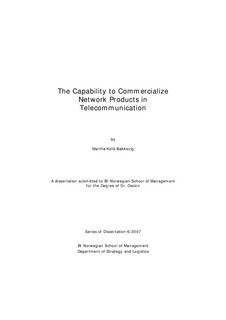The Capability to Commercialize Network Products in Telecommunication
Doctoral thesis
Permanent lenke
http://hdl.handle.net/11250/94292Utgivelsesdato
2007Metadata
Vis full innførselSamlinger
Sammendrag
When we consider buying food, clothes or furniture we normally appraise the goods based upon our personal needs independent of the number of other people who have bought or use the same type of item. Some types of goods, however, have a quality that makes them more valuable to us as the number of other users’ increases. Classical examples are telephone and fax-machine; a more recent one is video phone. These goods were of little value to the first individual who acquired them. The value increased with the total number of items in the network, because the total number of people with whom you could talk to or send and receive documents to, increased.
This phenomenon raises some questions relevant for the providers of these goods or services. Are the commercial and/or organizational challenges different when commercializing goods, which value depend on the amount of users, compared to when commercializing goods with an intrinsic value independent of other users? The theory of positive network effect has revealed that commercialization of network products can present difficulties that are specific for these types of products. The strong impact of direct network effects from inter-customer communication accentuates the importance of distribution rate, i.e. a rapid rollout, and reaching critical mass in order for customers to experience value. The question is whether these challenges require peculiar capabilities. Operational capabilities enabling product innovation in general have been identified, but the capability to commercialize network products and the dynamics of resources and new products in telecommunication contexts have not been examined. The main concern of this thesis is capabilities fostering commercialization of network products.
Serie
Series of Dissertations6/2007
